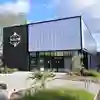Centre of Excellence for Data Science, Artificial Intelligence and Modelling
Breaking traditional boundaries to bring new technologies in data science and AI

Overview
Driving Innovation in AI, Data Science & Modelling
Our Centre of Excellence for Data Science, Artificial Intelligence and Modelling (DAIM) cuts across traditional disciplinary boundaries to be at the forefront of the exciting developments in the field of Artificial Intelligence (AI) and data science.
Our mission is to deliver a step-change in the provision of educational excellence, high-quality research, and knowledge exchange with industry.


Responding to the global AI and data science challenge
The power of artificial intelligence and data science is rapidly changing the world. This is seen in almost every walk of life and at every level of society.
We are educating the next generation of data scientists and artificial intelligence practitioners and conducting research in this vital field in response to this global challenge.
Partnerships
Exchanging knowledge to tackle complex global issues
At DAIM, we are breaking the traditional disciplinary boundaries to bring new technologies in data science and AI to a wide variety of sectors.
DAIM is a portal for business partnerships and delivers dynamic inter-disciplinary collaborations and external partnerships leading to research and skills outcomes that are of strategic priority to our region, the UK and the world.
Crucially, through knowledge exchange, DAIM’s ambitions encompass the provision of exemplary service within the University of Hull and beyond, which will enhance mutual goals and tackle complex industry issues.
Our Team
Our research
Responding to increased demand for qualified practitioners
Through the launch of the University’s new Centre of Excellence for Data Science, Artificial Intelligence, and Modelling, we are responding to the increasing need for qualified practitioners.
We are delivering a step-change in the provision of educational excellence and high-quality research, which cuts across traditional disciplinary, departmental and faculty boundaries.
Teaching the next generation
Bring together the skills and capabilities of leading researchers and educators to guide the fourth industrial revolution
Ground breaking collaborations
Cutting-edge, cross-disciplinary AI research to meet global challenges

Life changing research
At the Centre of Excellence for Data Science, Artificial Intelligence and Modelling (DAIM), we are breaking the traditional disciplinary boundaries to bring new technologies in data science and AI to a wide variety of sectors.
Our research underpins the University Strategy 2030 that orients around the themes of social justice and environmental sustainability, and the pillars of people, place, and partnership.
Research Themes
Research Projects
Get in touch